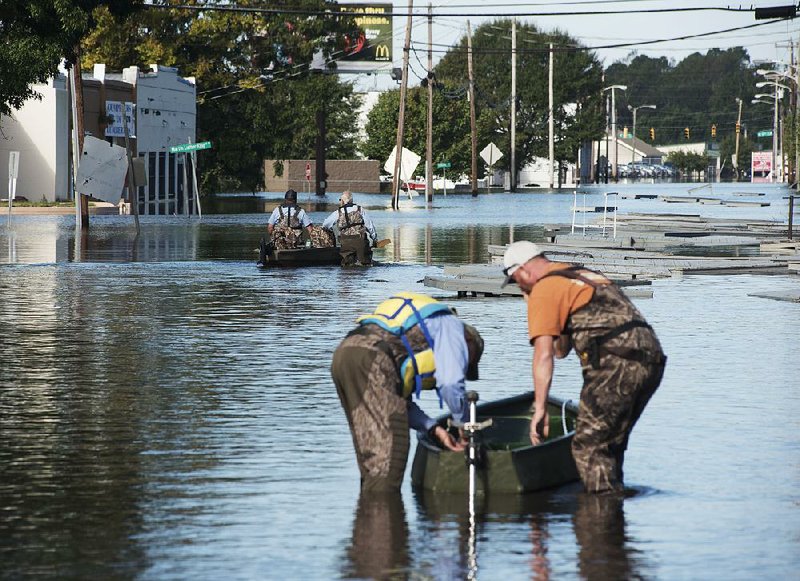LUMBERTON, N.C. -- For a storm that inflicted less damage than many had feared, Hurricane Matthew nevertheless impaired or destroyed more than 1 million structures, forced businesses from Florida to North Carolina to close and put thousands temporarily out of work.
RELATED ARTICLE
http://www.arkansas…">U.S. troops sail to Haiti with aid
In many affected areas, small-business owners were still assessing the damage.
"I've never had anything like this in 12 years of business," said Ami Zipperer, who has two garden supply stores in the Savannah, Ga., area.
Zipperer said she doesn't know how much she's lost or what insurance will cover. She said about 10 percent of her inventory of plants was damaged, but the bigger challenge will come from losing $5,000 to $7,000 a day in revenue. One store is still closed and many homeowners in the area, Zipperer said, aren't focused right now on landscaping.
[ MATTHEW’S IMPACT: Map of flooding so far]
All told, the storm probably caused $10 billion in damage, according to an estimate from Goldman Sachs. Insurance companies will likely be liable for about $4 billion to $6 billion of that total, according to an estimate Saturday by CoreLogic, a real estate data provider.
But the figures suggest Matthew's effect on the broader national economy will be minimal. Though damage estimates are usually revised higher after more comprehensive assessments, the current figures would still make Matthew the 22nd-worst storm since World War II, Goldman estimates.
By comparison, Hurricane Sandy, the second-worst storm, caused $15 billion to $20 billion in insured losses and $50 billion to $60 billion in overall damage in 2012.
Any economic losses pale in light of the 34 lives lost in the United States. Matthew also killed more than 500 people in impoverished Haiti.
A day after fleeing from the swollen Lumber River in North Carolina, the residents of the former mill town of Lumberton waded into the swirling floodwaters Wednesday.
About 1,200 residents had to be evacuated by boat and plucked from their roofs by helicopters as the river crested. Two of the state's 20 fatalities occurred in Robeson County, of which Lumberton is the seat.
Of all the towns affected by Hurricane Matthew, the city of 22,000 was among the hardest hit.
"It is just a heartbreak," said novelist Jill McCorkle, a Lumberton native. She and her husband, Tom Rankin, drove southeast from their home in Hillsborough, his pickup filled with diapers and drinking water. "It's a very poor area anyway."
Lumberton resident Keira McGirt holds hope the floods might help the town in the long run.
The 23-year-old beauty supply store clerk and her 3-year-old son escaped from the storm with nothing but the clothes they were wearing. They spent the night in a shelter and are now staying with a friend in the city.
On Wednesday, she stood in front of Gold Rush Beauty Supply, next to a shuttered Super Dollar store, handing out food and water. Despite some sporadic gunfire early on, she is proud of how residents have reacted.
"Lumberton needed this," she said. "We needed this to come together as a city."
The city thought it was prepared. But no one expected more than a foot of rain in less than 24 hours, on top of heavy rains the week before, said Jim Walters, deputy director of public works.
"We were in a pickle before this even started," Walters said, noting there was a weak point in the dike where the railroad goes under Interstate 95, which passes alongside the town.
Some of the waters have receded. But left behind is a sense of despair.
Terry Jones, 48, wept as he stood on a downtown sidewalk Wednesday morning. The water that rose to 4 or 5 feet deep destroyed everything in his home.
He's staying in his son's camper. The Smithfield pork-packing worker has lived in Lumberton his entire life and wiped tears from his face with his big hand when he thought about the enormity of what was ahead.
"I can't even get to work," he sobbed.
Lumbee Tribal Chairman Harvey Godwin Jr. said the tribe was struggling to get bottles of drinking water.
"It's kind of amazing," he said. "Life itself can't sustain without water, and what caused this was water."
"And you can't blame water," he added, "because it's just part of the environment, and it's part of what God's created for us to manage."
Information for this article was contributed by Tamara Lush, Allen G. Breed, Joyce M. Rosenberg and Alex Veiga of The Associated Press.
A Section on 10/13/2016
